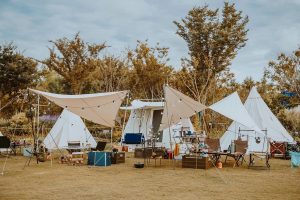13 Glamping
Luo Ye (罗叶)
Glamping
Glamping is a combination of Glamors and Camping. It is not like traditional camping where people depend on the wild. Instead, people bring modern technology and live in nature but do not depend on nature. Glamping began in the 16th century when King Henry the 8th had a summit in the wilderness. Since then, glamping has been all over history. In recent years, Glamping has gained popularity in China. Since 2020 when the pandemic was ongoing. Due to covid restrictions, many Chinese (mainly the younger generation) are unable to leave the country, which led to the idea of exploring the outdoors in China. Thereafter many entrepreneurs got the concept of glamping to attract more young people to the outdoors. Since the idea was introduced, it became a trend in China. Many Chinese youths liked the idea of living in the outdoors but not giving up comfort. What’s more, many clothing companies and websites like Xiaohongshu (Little Red book) and e-commerce platform like Instagram. It started to advertise glamping, which raised curiosity in people to go glamping and experience it for themselves. The general pricing for an overnight stay in Beijing is around $148 per person. It varies where the person decides to stay. Staying in a Glamping resort activities usually includes a number of activities and accommodations. Subsequently, Glamping has been successful in popularity and economically. Glamping is predicted to rise in popularity as the years pass by. From 2021 to 2022 glamping in China soared by over 50%.

Consequently, this event has started to affect people’s way of thought about the work values and culture placed in China in the younger generation. Now, the younger Chinese generation is getting accustomed to the slower lifestyle and is rethinking life-changing choices. With this ideology of the younger generation in China, many entrepreneurs in the glamping industry have been advocating to experience a slow life. In addition, glamping entrepreneurs had been resistant to developing nearby land with budlings since it would destroy the purpose of being in nature in a glamorous style. However, with the slow lifestyle ideology within the younger generation in China businesses and companies are starting to notice this trend since they highly value the high-pressure fast paced work lifestyle. This idea could become a problem soon in the work field. However, many people think this is more of a craze and since it is a trend it will die down in the future when the travel agencies and the government loosen their covid restrictions and the glamping trend would drop but would still be here to stay at a stable level.

Citations
Clarke, Brandon. “Glamorous Camping Also Known as Glamping.” John Bailey Company, 10 Apr. 2020, https://www.johnbaileyco.com/glamorous-camping-also-known-as-glamping/#:~:text=It%20is%20noted%20that%20the,and%20Francis%20I%20of%20France.
Fu, Zi Jing. “Thanks to Xiaohongshu, Camping, or ‘Glamping’, Is on the Rise in China amidst Covid Travel Restrictions.” PingWest, https://en.pingwest.com/a/10165.
“How Camping Became the New Travel Trend in China.” Toppan Digital Language, 7 June 2022, https://toppandigital.com/translation-blog/how-camping-became-the-new-travel-trend-in-china/.
Zhang, Ziyu. “How Glamping Became China’s Hottest New Travel Trend.” CNN, Cable News Network, 10 June 2022, https://www.cnn.com/travel/article/glamping-china-trend-cmb-intl-hnk/index.html.

